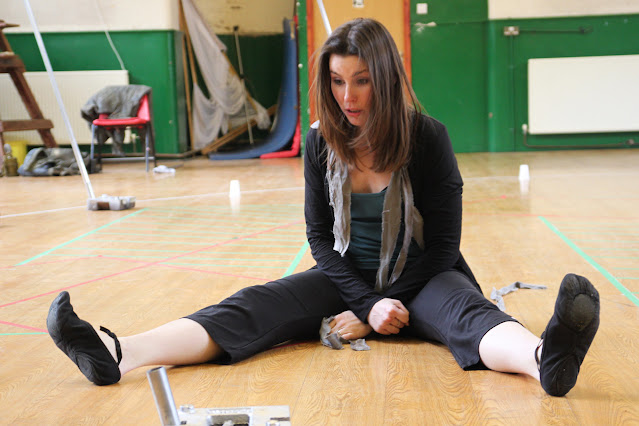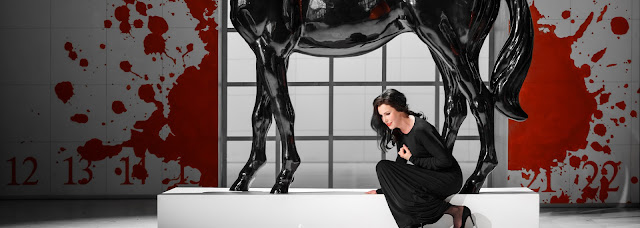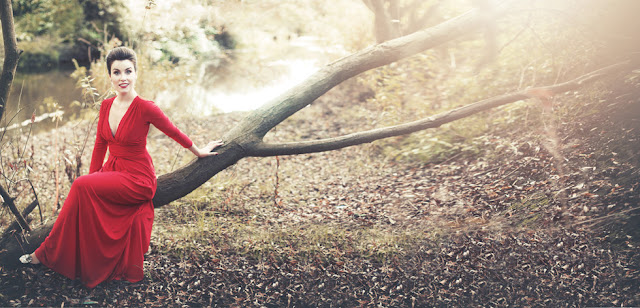%20in%20Irish%20National%20Opera's%20La%20Boh%C3%A8me.%20Image,%20Ros%20Kavanagh.jpg) |
| Puccini: La Boheme - Anne Devin - Irish National Opera (Photo Ros Kavanagh) |
The Irish soprano Anna Devin has made something of a name for herself in recent years singing roles in Handel opera, and last Summer garnered plaudits for her Melissa in Handel's Amadigi di Gaula at Garsington Opera. And whilst there have always been other composers, other eras in her repertoire, this year is going to show us Anna in more romantic repertoire. This month Irish National Opera's (INO) new recording of Puccini's La Boheme came out Signum Classics featuring Anna as Musetta, and then in June she returns to INO to perform Elisabetta in Donizetti's Maria Stuarda with further Donizetti to come. I recently met up with Anna by Zoom to chat about the challenge new roles as well as her continuing passion for the Baroque repertoire.
In fact, Anna has sung Musetta before or rather extracts from the role. When she was at the National Opera Studio in 2009 there were two sopranos who included the role of Mimi as one of their major studies, which meant that Anna came to sing extracts from the role of Musetta in opera scenes, and she enjoyed returning to the role again. From the outset, however, the project at Irish National Opera was beset with difficulties because of the pandemic. Planned as a staging of Puccini's La Boheme it became a live-streamed concert (from Bord Gáis Energy Theatre in Dublin on 13 March 2021) conducted by Sergio Alapont with a recording. [Read the review of the original concert in the Arts Review] But for a number of months, right up until she left home, it still was not clear whether the project would go ahead. And when she arrived in Ireland, Anna had, of course, to isolate for 10 days.
To make matters more complex for her, she had been on maternity leave during the initial part of the pandemic and this was her first engagement since then, and frankly she was somewhat relieved that there was only a concert performance. But the circumstances meant that is was an unforgettable project. All those who were not currently resident in Ireland had to isolate, and then there was the joy of being able to see people and perform together again. The performance and recording were a big deal for everyone, and Anna is interested as to whether this will come over in the recording.
 |
| Verdi: Falstaff - Anna Devin, Luis Gomes Royal Opera House (Photo ROH /Catherine Ashmore) |
Puccini, however, is certainly not unfamiliar. When she was a Jette Parker Young Artist at Covent Garden she covered roles in Puccini's Gianni Schicchi and Il Tabarro in Richard Jones production of Puccini's Il Trittico, and even got to go on, singing Lauretta. At the time she was a Covent Garden, the company was doing no Baroque opera so her period was spent doing bel canto repertoire, Puccini and Nanetta in Verdi's Falstaff.
Returning to Musetta, and to Puccini, after so many years has, Anna feels, been good for her voice. Musetta, in fact, sits rather in the middle of the voice with just occasional high moments, and it needs a singer with a rich, middle voice. Also, Puccini is one of Anna's favourite composers to listen to and she feels that singing music you love is the best, in brings out the sensitivity in you.
On 5 June 2022, Irish National Opera's new production of Donizetti's Maria Stuarda debuts at the Gaiety Theatre, Dublin, directed by Tom Creed, conducted by Fergus Sheil with Tara Erraught in the title role, Anna Devin as Elisabetta and Arthur Espiritu as Leicester. And when we speak, the role of Elisabetta was sitting on Anna's piano where she has been busy learning it. The idea to sing the role was, again, Fergus Sheil's as he wanted to do an opera that featured Anna together with Irish mezzo-soprano Tara Erraught as part of his desire to cast Irish singers in roles. It will not be the first Donizetti that Anna has sung and she decided to give it a go and 'see what happens', after all Donizetti is essentially about beautiful singing and legato. It is a relatively compact role, as Anna describes it Elisabetta comes in, is a bit hard core and leaves! Anna finds Elisabetta a fascinating character with an air of innocence about her with her unrequited love. The character intrigues her, and she is interested in how the work will be staged because in the libretto a lot of Elisabetta's emotional outpourings are in public and so can seem naive.
 |
| Haydn: L’isola disabitata - Anna Devin in rehearsals for Royal Opera's Jette Parker Young Artists performance in 2013 (Photo © ROH/Chris Shipman,) |
I was interested to find out what Anna saw the differences were between performing Donizetti and Handel. She laughs, and comments that it is far quicker to learn Donizetti. With Handel operas there are extensive secco recitatives (accompanied just by harpsichord and continuo group) which 'go on from here to the end of the year'. To make these recits live you have to work and use your imagination to lift the music off the page. With Donizetti, the recitatives are all orchestrally accompanied and the musical treatment thus becomes more obvious as Donizetti helps you along, and so the music is quicker to learn. Though the learning process is the same for music by both composers.
But with Donizetti there is also the matter of doing ornamentation in the right style. With Elisabetta, not that much of her music is repeated but when it is Anna wants to include ornaments. And, the role of Elisabetta sits quite low, so she has to take care of the placement of the voice and does not dig down too much so she can access the top. With both composers, Anna feels that you have to take care of the sound, and legato is needed. Partly this commonality occurs because Anna feels that Handel's music, even the runs, need to be fully sung in and then you can add baroque style to that firm basis. (And my apologies to Anna if I have managed to mangle her entirely lucid explanation).
We go on to chat about the voice more generally. The voice needs constant work and she feels that it is good to continue to be inquisitive, to look at new things. Everyone's instrument is different, with different ways of doing things but it all comes from the breath in the end. And we have an extended discussion about vibrato and straight tone (no vibrato, often used in Baroque performance), and how Anna has found she can sing both on full voice, going from one to the other with the same perfectly formed position.
But with changing styles of music, she is careful about programming and not allowing much overlap so that when she gets properly into the Donizetti opera there is no Baroque opera. The stylistic difference in the music between the two composers might not be huge, but it makes a difference.
 |
| Handel: Amadigi - Anna Devin - Garsington Opera (Photo Julian Guidera) |
Anna is enjoying being able to be involved in INO, finding it fabulous to have a national opera company that is of international standard but using Irish singers. The company was launched in 2018 following the merger of two smaller companies (though it has its roots in the Dublin Grand Opera Company, later Opera Ireland, which lasted from 1941 to 2010). Prior to INO, much arts funding for opera in Ireland was project based which meant that it was often difficult to plan far enough in advance to be able to book Irish singers who were based all around the world. Anna and Tara Erraught were in college together and she finds it great to be able to perform with her at home, to an Irish audience. She points out that the history of opera in Ireland is not long, and that there is a lot of teaching to be done as the average person has not been exposed to it and may know little about it.
Looking ahead, there is more Donizetti to come as Anna will be making her role debut in the title role of Donizetti's Lucia di Lammermoor during the 2022/23 season. She finds this exciting and is looking forward to getting her teeth into it. In fact, the opportunity came out of those Garsington performances of Handel's Amadigi in 2021. This was complex and difficult because of social distancing but she feels that director Netia Jones and the cast were able to take the characters on a psychological journey and create a brilliant production. And out of this psychological journey came the offer of Lucia, another complex character.
Anna enjoys singing the complex, dramatic roles, characters she can get her teeth into, and certainly playing Lucia is not the same as playing a coquette! She has always loved drama and loved the stage, and she loves forming the characters, getting to grips with complexities. Whilst she has a number of other exciting projects ahead, she is also learning to balance her performances. She has two young girls, and so is aware of the need for balancing work and family. She is trying to do just operas that she wants to be in. The problem is that she loves everything, and realises that she needs to be 'a bit fussier'.
 |
| Anna Devin (Photo Victoria Cadisch) |
And this brings us back to the strange circles of life and how she is currently having a Donizetti moment, whilst in 2016 she did around 30 performances of Susanna in Mozart's Le nozze di Figaro (which eventually added up to a total of 45), but has not sung the role since. And despite the Donizetti roles, she is not saying goodbye to Baroque opera, whilst one role she has her eye on is the title role to Handel's Alcina; Anna has sung Morgana in the opera, she has never done Alcina.
Though in the current climate, simply being able to get out an sing is great. A recent production at Lyons Opera that she was involved in ended up having 10 (out of 15) performances cancelled. And she finds it interesting to consider what happens to the opera industry in the next year or so. She points out that so many experienced singers are either not returning to singing or considering leaving the business, and how the cancellation of performances and productions can have such a terrible effect on freelance singers' income. But then again, there are so many talented young singers, eager to take up the space.
 |
| Tara Erraught & Anna Devin in Irish National Opera's publicity for Donizetti's Maria Stuarda |
Puccini: La Boheme - Celina Byrne, Anna Devin, Merūnas Vitulskis, David Bizic, Ben McAteer, John Molloy, Irish National Opera, Sergio Alapont - Signum Classics
Donizetti: Maria Stuarda - Tara Erraught, Anna Devin/Amy Ní Fhearraigh, Gemma Ní Bhriain, Arthur Espiritu, Giorgio Caoduro, Irish National Opera, director: Tom Creed, conductor: Fergus Sheil - 5-22 June 2022, Dublin, Cork, Wexford, Limerick - further details from INO website
Never miss out on future posts by following us
The blog is free, but I'd be delighted if you were to show your appreciation by buying me a coffee.
Elsewhere on this blog
- Earth's Wide Bounds: William Vann & the Chapel Choir of the Royal Hospital, Chelsea in RVW's Communion Service in G minor - record review
- Writing against the grain: late-romantic horn concertos by Malcolm Arnold, Christoph Schönberger & Ruth Gipps from Ben Goldscheider - record review
- Portuguese violinist Bruno Monteiro in a striking programme of three major early 20th century violin sonatas, from Portugal, France and Brazil - record review
- Fidelio Trio explores Moeran's early chamber music, revealing a mix of Romantic harmonies, Continental influences and a sense of engagement with Irish musical culture - record review
- Le Destin du nouveau siècle: a hitherto unknown opera-ballet by André Campra provides a glimpse into the largest Jesuit teaching institution in Paris, and some engaging music - record review
- He enjoys the way his composition now touches lots of different worlds: I chat to Pascal Schumacher about his latest album - interview
- Two strongly contrasting yet major figures from 20th century Hungary, György Ligeti and Zoltán Kodály - record review
- Surprising style, elegance and imagination: Auber Overtures volume five - record review
- Guilty pleasures: Sondra Radvanovsky in the closing scenes of Donizetti's three major Tudor operas - record review
- Having recently recorded Lasse Thoresen's virtuosic cello concerto, I chat to Norwegian cellist Amalie Stalheim about new music, and the continuing importance of the Romantic repertoire - interview
- A room of mirrors: Emiliano Gonzalez Toro, Zachary Wilder and Ensemble I Gemelli - record review
- Bleckell Murry Neet: Traditional tunes from Cumbria in engaging modern versions for guitar and harp - record review
- Home











No comments:
Post a Comment